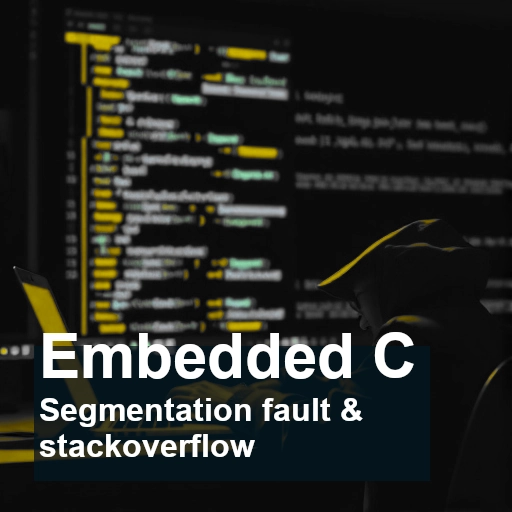In the world of C programming, two common types of runtime errors that programmers encounter are Segmentation Faults and Stack Overflows. Both are serious issues that cause a program to crash, but they occur due to different reasons. Understanding the causes, differences, and ways to prevent or handle these errors is crucial for writing stable and efficient C programs.
What is a Segmentation Fault?
A Segmentation Fault (Segfault) occurs when a program tries to access memory that it is not allowed to access. The term “segmentation” comes from the way memory is divided into segments in a program’s address space. These segments typically include areas for the program’s code, stack, heap, and data. When a program accesses a memory location outside of its allocated segments or tries to access restricted memory regions, the operating system raises a segmentation fault and halts the program.
Common Causes of Segmentation Faults:
Dereferencing a NULL or Uninitialized Pointer: This is one of the most common causes. If a pointer hasn’t been initialized to a valid memory address or is set to NULL, dereferencing it (i.e., accessing the memory it points to) causes a segmentation fault.
int *ptr = NULL;
printf("%d", *ptr); // Segmentation FaultBuffer Overflow: When a program writes more data to a buffer than it can hold, it can overwrite adjacent memory, leading to a segmentation fault. For example, writing beyond the end of an array.
int arr[5];
arr[10] = 100; // Segmentation FaultAccessing Freed Memory (Dangling Pointer):After memory is freed using free(), the pointer still holds the address of the freed memory. Accessing this memory after it has been deallocated leads to a segmentation fault.
int *ptr = malloc(sizeof(int));
free(ptr);
*ptr = 10; // Segmentation FaultStack Overflow (due to deep recursion): When a function calls itself recursively without an adequate base case or an excessively large recursion depth, it consumes all available stack space, leading to a segmentation fault.
void recursive_function() {
recursive_function(); // No base case, leads to Segmentation Fault
}How to Handle or Prevent Segmentation Faults:
- Initialize Pointers: Always initialize pointers before using them.
- Check for NULL: Always check if a pointer is NULL before dereferencing it.
- Avoid Buffer Overflows: Always ensure that buffers have sufficient space for the data you are writing.
- Use Safe Memory Functions: Use functions like strncpy() instead of strcpy() to prevent buffer overflows.
- Debugging Tools: Use tools like gdb, Valgrind, or AddressSanitizer to help identify and fix segmentation faults.
What is a Stack Overflow?
A Stack Overflow occurs when the call stack, a special region of memory that stores function call information (such as local variables, return addresses, etc.), exceeds its allocated size. This typically happens when a program uses excessive recursion or allocates too much local data on the stack.
The call stack grows as functions are called. Each time a function is called, a stack frame is created, storing information like local variables and return addresses. If the program keeps calling functions recursively or allocates large local variables, the stack will eventually run out of space, causing a stack overflow.
Common Causes of Stack Overflow:
Excessive Recursion: Recursion is a technique where a function calls itself. If a recursive function doesn’t have an adequate base case or keeps calling itself endlessly, it will consume all the stack space.
Large Local Variables: Allocating large arrays or structures as local variables in a function can quickly consume stack space.
void large_stack_variable() {
int large_array[1000000]; // Stack overflow due to large array
}How to Handle or Prevent Stack Overflow:
- Limit Recursion Depth: Always ensure recursive functions have a proper base case to prevent infinite recursion.
- Use Iteration Instead of Recursion: If possible, replace recursion with iteration, especially for problems that don’t require deep recursive calls.
- Allocate Large Data on the Heap: For large arrays or data structures, dynamically allocate memory on the heap instead of the stack using malloc() or calloc().
void large_heap_variable() {
int *large_array = malloc(sizeof(int) * 1000000); // Allocates on the heap
}Key Differences Between Segmentation Fault and Stack Overflow
| Aspect | Segmentation Fault | Stack Overflow |
| Cause | Accessing restricted memory or invalid memory addresses. | Exceeding the available stack space due to deep recursion or large local variables. |
| Memory Area Affected | Generally affects the heap or global data sections. | Affects the stack, which stores function calls and local variables. |
| Typical Error | Accessing NULL pointers, buffer overflows, or dangling pointers. | Infinite recursion or large local variables. |
| Detection | Detected immediately when invalid memory is accessed. | Detected when the stack limit is exceeded. |
| Error Handling | Requires fixing memory access violations. | Requires reducing recursion depth or using heap memory. |
Conclusion
Both segmentation faults and stack overflows are critical issues that C programmers must be aware of. A segmentation fault occurs when a program tries to access memory it isn’t allowed to, while a stack overflow occurs when the call stack runs out of space. By understanding the causes of these errors and employing proper techniques to prevent them—such as checking pointer validity, limiting recursion depth, and using heap memory for large allocations—programmers can write more stable, efficient C code. Tools like gdb and Valgrind can help identify and debug these issues, making them an essential part of the development process.

